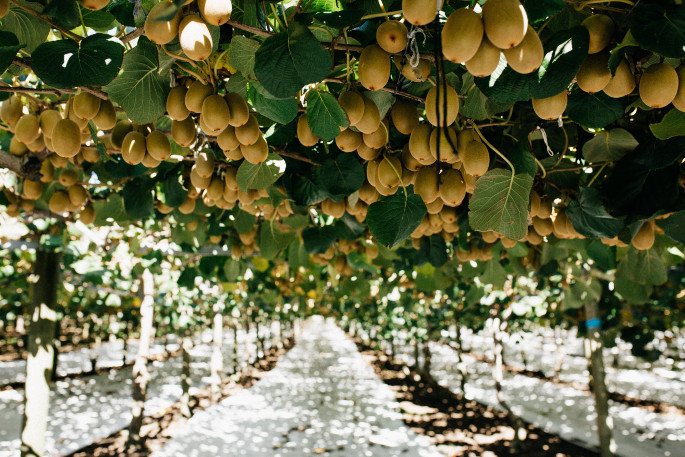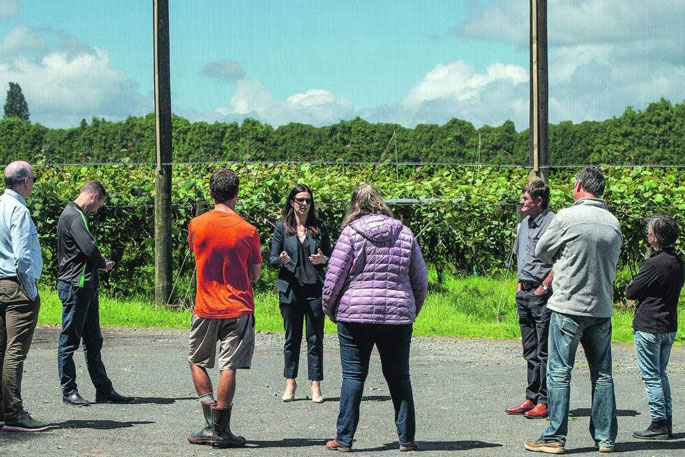Growers desperate for workers are building their own accommodation, bumping up wages, and trying to recruit backpackers before they arrive in the country.
A handful of Eastern Bay of Plenty primary industry employers turned out to meet with National party immigration spokeswoman Erica Stanford at a Te Rahu Road kiwifruit orchard in late November.
Stanford was there to hear about some of the issues facing orchardists and farmers due to worker shortages in New Zealand, particularly RSE (Recognised Seasonal Employer) workers and working holiday makers.
'We're working on an immigration policy at the moment so I'm talking to people and making sure that we are on the right track, hearing their stories.”
She said the current immigration policies had made New Zealand an unattractive proposition for workers compared to countries such as Australia, Canada and Britain. The slowness to open borders to workers at the beginning of the year along with hold-ups with visa processing times had put huge strains on primary industries such as kiwifruit. She said she also had concerns about upcoming legislation restricting people on work visas being able to stay more than three years.
'If they've got to go after three years, they're not going to want to come in the first place,” she said. 'They will go to countries where they have that surety of being able to become permanent residents.”
Sybton Horticulture chief executive Robert Humphries talked about the difficulty of trying to grow his business with a lack of staff. He said he was having to pay local staff up to 15% more than they were worth from a productivity standpoint.
'If we were making good money, we could reinvest it on training them so they did a better job.”
He said it was a major factor in restricting growth of the industry.
.jpg) Orchardists are hanging out for more workers, with one saying managers recruit working holidaymakers online before they arrive in New Zealand.
Orchardists are hanging out for more workers, with one saying managers recruit working holidaymakers online before they arrive in New Zealand.
Orchardist Elly Sharp from Tirohanga Fruit Company, near Ōpōtiki, said she had just built a new 30-person accommodation unit for workers and hoped to have it full of RSE and working holidaymakers year-round.
She said caps on RSE workers meant they relied more on backpackers. Her managers used social media to recruit holidaymakers before they came into the country, because if they went to Auckland or Tauranga first, they would be absorbed into the employment market there without ever reaching the Eastern Bay.
They needed to offer subsidised and guaranteed accommodation.
'There's no accommodation in Ōpōtiki so we have to help them, or they won't come.”
Local Democracy Reporting spoke to Ōpōtiki Mayor David Moore, who was involved with the kiwifruit industry for about 20 years and has been an orchard owner.
He said while he disagreed with Stanford's approach to the problem, it was a serious issue for orchardists.
'If you can't get your work done - if your crop is not picked on time - you're in serious trouble”.
'I've been meeting with different organisations all week, basically involved in the same issues. It's challenging. National's answer is to bring everyone in from overseas. But where do we house them?”
He felt more needed to be done to make horticulture a more attractive prospect for local youth.
'We have a lot of people on Jobseeker benefits. We need to look at how we get our young people to not look down on being in the horticulture industry. We need to find ways to help them through the fact that a lot of this is seasonal work. Horticulture is a very exciting industry, but you do have to bridge that gap of seasonal to full time employment.”
He said that in Ōpōtiki, the council, iwi groups and industry were working together to try to solve some of those issues.
Just this week he had handed out 105 certificates to young people involved with the mayoral taskforce for jobs.

Thornton dairy farmer Alan Law said he felt the employment market was 'quite badly broken” and wondered if it was part of the current government's agenda.
He said the staff shortages affected everyone, whether they were in the building industry, tradesmen, health, hospitality or primary industries.
'Everybody, right across the board, is short of staff and there's nothing being done. Are they purposely running their resource of employees down? Is this part of a hidden agenda or am I overthinking it?” he asked Stanford.
'I am starting to come around to the view that it is absolutely deliberate,” she said. 'They are using it as a vehicle to drive up local wages.”
She described the Labour Government's talk of low unemployment rates as 'tone deaf”.
'I've talked to business owners across the country who are washing dishes or at front of house in hospo. They've had two years of horrific times and stress and fear. This was the year where we had to get ourselves out of it. We should have had workers back at the beginning of the year rather than mid this year. We've wasted this opportunity and next year we're going into a recession so that window of opportunity we have had to get workers in and rebuild our economy is gone.”
She told Local Democracy Reporting immigration was more important now than it had ever been before.
'You don't usually see parties putting immigration policies front and centre but as you've heard, it's dire.”
 Focusing on the skills New Zealand needs – instead of 'a focus on large volumes of low wage labour in some sectors” – is the Government's plan, said immigration minister Michael Wood. Photo: Robert Kitchin/Stuff.
Focusing on the skills New Zealand needs – instead of 'a focus on large volumes of low wage labour in some sectors” – is the Government's plan, said immigration minister Michael Wood. Photo: Robert Kitchin/Stuff.
Minister of Immigration Michael Wood told Local Democracy Reporting that in recent months the Government had delivered the largest increase in a decade to the RSE scheme and that the Government's immigration rebalance, introduced in May, was designed specifically to address the immediate skill shortages in New Zealand.
'A key feature of the rebalance is a focus on building the skills that New Zealand needs, as opposed to the old system which had a focus on large volumes of low wage labour in some sectors. This is a shift but it will be better for the New Zealand economy, and it will reduce the unacceptable levels of migrant exploitation that the old settings facilitated.”
He said that, as the world recovered from Covid-19, labour shortages continued to be a persistent ongoing global symptom.
'Covid brought the world to a standstill. While we can ensure the ability for those to come and work here, we acknowledge that people to people movement globally remains slow when compared to pre-Covid levels, and this is being particularly felt by the hospitality and tourism sectors who traditionally rely on international workers.
'There is a steady return of other key labour sources, with over 20,000 working holiday visitors arriving in country, out of the 38,000 approved since March and thousands more are expected to arrive in the coming months. In order to help these sectors to retain staff we have extended the visas of working holiday makers already in New Zealand with visas expiring between 26 August 2022 and 31 May 2023 by six months. We have also provided an additional opportunity for those who previously held a working holiday visa but didn't travel due to Covid-19 to come to New Zealand for the summer.
-Local Democracy Reporting is Public Interest Journalism funded through NZ On Air.




0 comments
Leave a Comment
You must be logged in to make a comment.